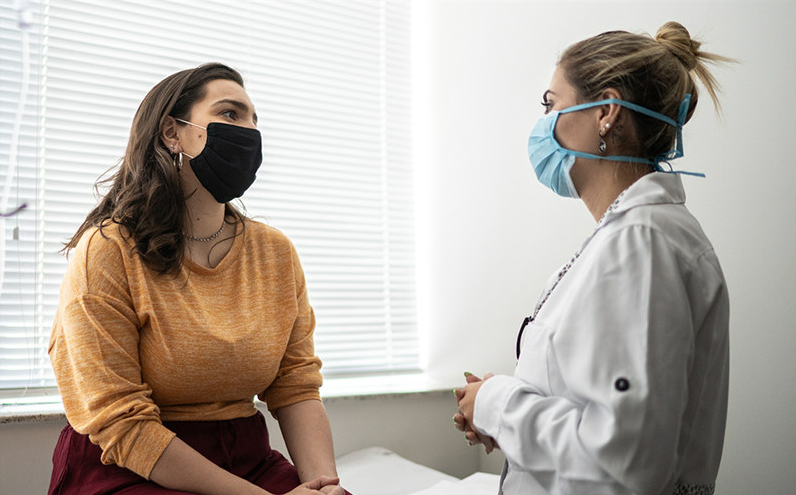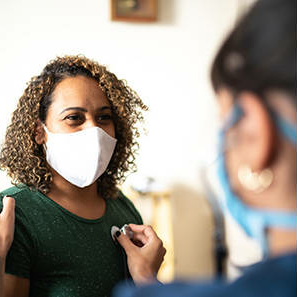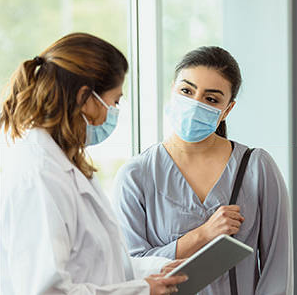5 Non-pregnancy Reasons to See Your OB/GYN

What do obstetrician-gynecologists (OB/GYNs) actually do? If providing pregnancy care and treating menstrual disorders came to mind, that’s true – but it’s only part of the answer.
OB/GYN providers are experts on women’s health and well-being at every age, from young adulthood through your senior years. This includes not only reproductive health concerns but also menopause challenges and overall health maintenance. Here’s how working with an OB/GYN provider can help you achieve optimal health for whatever life stage you’re in.
In this blog:
1. Well-Woman Visits
Well-woman visits are full checkups that should be done annually. This type of visit focuses on your health and wellness through preventive care. Your well-woman visit can include up to three exams, including:
Physical Exam.

During this exam, your OB/GYN will check your vitals (such as your blood pressure); listen to your heart and lungs for any irregularities, fluid build-up, infections; and examine parts of your body such as your neck and belly to learn more about the health of your lymph nodes, thyroid, circulatory system, and organs. You’ll also be encouraged to share your health history and sometimes provide a urine sample or blood work to check for certain health conditions, such as a thyroid issue.
Breast Exam.
Here your OBGYN will look for signs of breast cancer. “This may include a checking for lumps, thickening, swelling, dimpling, and pain in any part of the breast or under the arm,” explains OB/GYN Physician Stacey Sensor, DO, FACOOG, of Munson Healthcare Otsego Memorial Hospital.
Pelvic Exam.
Your OB/GYN will examine both the exterior and interior of your vagina and reproductive organs, using a speculum to open the walls of your vagina and peer inside. While she feels around your vagina and cervix, she’ll press down on your belly and inquire about any tenderness and pain your feel, which could signal an infection or problem. While this portion of your visit might feel a little uncomfortable, it’s critical to help screen for any enlargements, cysts, tumors, and other potential abnormalities.
Your OB/GYN will also likely discuss further screenings, such as a mammography, colonoscopy, or skin cancer screening as well as advise you on recommended vaccines, diet, and physical activity for your age range and level of health.
2. Critical Screenings
Screenings are often undervalued or neglected by both men and women – but they’re an important health tool, designed to catch diseases as early as possible, when they’re much easier to treat.
“Now that we appear to be moving past COVID-19, we're hoping that women will get back to seeing their providers and get their annual screenings for two big enemies that women need to take seriously: cervical and breast cancer,” says Dr. Sensor. “Oftentimes, there are no signs or symptoms with cervical cancer, but it’s treatable if caught early."

Cervical cancer screening begins with a PAP smear, which can be performed at the same time as your pelvic exam. During this quick screening, a sample of your cervix cells is collected and sent to a lab to test for cancer and other abnormalities. Depending on your results, your OB/GYN will let you know how often you should be screened for reproductive cancers.
Likewise, breast cancer can be detected early on through screening (aka a mammogram). “Some studies show that by the time you're able to feel a lump in your breast, it's been there for years. If we catch breast cancer early, we're able to treat it with either surgery, radiation, and sometimes chemotherapy and cure you,” explains Dr. Sensor.
Additionally, your OB/GYN may advise you on screening for colon cancer, potential heart disease, diabetes, and osteoporosis.
3. Managing Menopause
Menopause can lead to many symptoms that feel overwhelming, uncomfortable, and even humiliating at times. But you don’t have to navigate this part of your journey alone. Your OB/GYN can help you manage these symptoms – like night sweats, hot flashes, and vaginal dryness. “We can recommend various treatments including natural herbal OTC options, Biofeedback, and Hormone therapy if needed,” says Dr. Sensor.
4. Urinary Incontinence
Bladder control problems can begin to impact women as early as their 20s and may become more of a challenge with age. A fairly common trouble for women, urinary incontinence includes urinary frequency, urgency, and leakage with exercise. Perhaps not surprisingly, coping with bladder control issues can also impact your ability to concentrate and your overall mental well-being. But your OB/GYN can help, starting with exercises to help strengthen your pelvic floor muscles. Sometimes, physical therapy, medical, or even surgical correction is recommended.
5. Sexual Health
Your OB/GYN provider is also your go-to expert for sexual health – from birth control to sexual dysfunction. “We will provide you with a birth control option that best suits your lifestyle, advise you on safe sex practices, test for infections, and evaluate your vaginal health,” explains Dr. Sensor. “We can also assist in determining causes and treatment for decreased sex drive and painful intercourse.”
When is the last time you saw your OB/GYN? If it’s been over a year, schedule your well-woman visit right away, and be sure to mention any of the above problems you may be facing so your OB/GYN can help.
Find an OB/GYN Near You
Are you working with an OB/GYN? Use our Find-a-Doc service to find an OB/GYN close to home in northern Michigan.
Do You Have a Solid Wellness Routine?

Work and sleep aside, do your days include activities that bring you joy? There’s a good chance that the things you love most – like yoga, time with friends, or reading – can also boost your overall health. Our Wellness Routine Toolkit can help you identify the things you value most and build them into your daily or weekly routine. Want to start living a more meaningful life, enriched with the things you love? This toolkit will help you do just that!